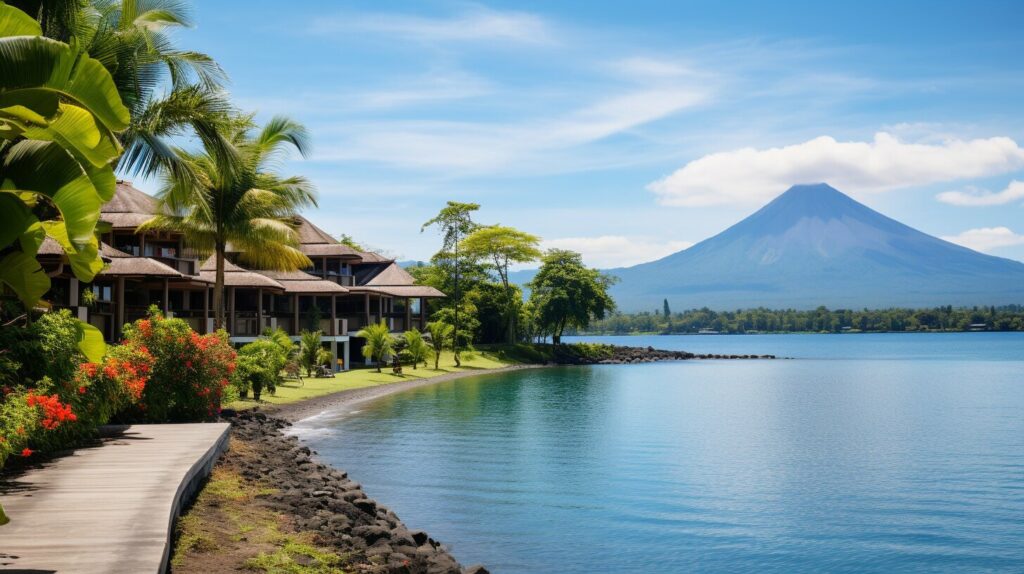Discover the Best Places in Costa Rica to Retire!
Retiring in Costa Rica has become increasingly popular in recent years, thanks to its warm climate, stunning natural surroundings, and affordable cost of living. For retirees seeking a laid-back lifestyle and a new adventure, Costa Rica offers a wealth of options for retirement destinations.
Whether you’re looking for a beachfront paradise, a bustling city, or a tranquil mountain retreat, Costa Rica has something for everyone. In this article, we’ll explore the best places to retire in Costa Rica, taking into account factors such as amenities, affordability, and lifestyle options.
Key Takeaways:
- Costa Rica is an attractive retirement destination offering a warm climate and stunning natural surroundings.
- Retiring in Costa Rica provides a wealth of options for destination, including beachfront, city and mountain living.
- This article will explore the top retirement destinations in Costa Rica, tips for retiring in the country, cost considerations, and the pros and cons of retiring in this beautiful country.
Retirement Destinations in Costa Rica
Costa Rica is an attractive destination for retirees due to its beautiful landscape, warm climate, and welcoming culture. However, choosing the right retirement destination in Costa Rica can be challenging. Here are some retiring in Costa Rica tips and best retirement spots in Costa Rica to consider:
1. Atenas
Located in the Central Valley, Atenas is a popular destination for retirees due to its pleasant climate and affordable cost of living. The town has a small expat community, making it easier for newcomers to adjust to the local culture. Atenas is also known for its fresh produce and easy access to the capital of San Jose.
2. Tamarindo
If you’re looking for a retirement spot with beautiful beaches, Tamarindo on the Pacific Coast is an excellent choice. This small town offers retirees a laid-back lifestyle with plenty of opportunities for water activities and outdoor adventures. However, the cost of living may be higher than other areas in Costa Rica due to its popularity among tourists.
3. Escazu
For retirees that prefer city living, Escazu, located near San Jose, offers a modern and luxurious lifestyle. The area is home to high-end shopping malls, restaurants, and medical facilities. Although the cost of living is higher in Escazu, it provides retirees with the convenience of living in a bustling city without sacrificing comfort.
When considering a retirement destination in Costa Rica, it’s essential to factor in your lifestyle preferences and budget. Researching each town’s amenities, climate, and cost of living will help you make an informed decision.
Cost of Retiring in Costa Rica
Retiring in Costa Rica can offer a comfortable and affordable lifestyle for many retirees. However, it is essential to consider the cost of living, housing, healthcare, and other expenses when planning a retirement budget.
While the cost of living in Costa Rica is generally lower than in the United States, it can still vary depending on the location and the retiree’s lifestyle choices. For example, living in the capital city of San Jose may be more expensive than living in smaller towns or rural areas. Renting a home or apartment in Costa Rica can range from $500 to $1,500 per month, depending on the location and the size of the residence.

Healthcare expenses are also a significant consideration for retirees, and Costa Rica offers a high standard of healthcare services at a fraction of the cost in the United States. Retirees can expect to pay an average of $100 per month for private health insurance and receive excellent medical care at private clinics and hospitals. The public healthcare system is also available to retirees, and they are eligible for discounts on medications and medical services.
Another factor to consider is the retiree benefits available in Costa Rica, which can help offset the cost of living expenses. Retirees who receive a pension or other income from abroad are entitled to a monthly tax exemption of up to $2,500, and they can avoid paying taxes on their foreign income in Costa Rica. Additionally, Costa Rica offers various discounts to seniors, including reduced rates for public transportation, entertainment, and cultural events.
Overall, the cost of retiring in Costa Rica can be affordable for many retirees, but it is essential to do thorough research and budgeting before making a relocation decision. By taking into account personal preferences, lifestyle needs, and financial capabilities, retirees can enjoy an excellent quality of life in this beautiful country.
Pros and Cons of Retiring in Costa Rica
Retiring in Costa Rica has become a popular option for many seniors seeking an affordable, comfortable, and welcoming retirement destination. However, like any major life decision, retiring in Costa Rica has its pros and cons that should be carefully considered before making the move. This section will take a closer look at both the advantages and disadvantages of retiring in Costa Rica, with a particular focus on healthcare and other factors that can impact retirees.
Pros of Retiring in Costa Rica
One of the most significant benefits of retiring in Costa Rica is the pleasant climate. With temperatures ranging from 70 to 90 degrees year-round, retirees can enjoy sunny and warm weather almost every day. Costa Rica is also known for its natural beauty, with an abundance of pristine beaches, lush rainforests, and breathtaking national parks. The country’s friendly and welcoming culture, as well as its affordable cost of living, make it an attractive option for many retirees.
Furthermore, Costa Rica has a robust healthcare system that provides high-quality medical care at a fraction of the cost in the United States. The country’s public healthcare system, known as the Caja, offers comprehensive medical coverage to all residents, including retirees with residency status. Private healthcare facilities are also available, with many expats opting for private insurance and medical care.
Cons of Retiring in Costa Rica
Despite its many advantages, retiring in Costa Rica does have some potential drawbacks. One of the biggest challenges for retirees is the language barrier, as Spanish is the primary language spoken in the country. While many locals speak at least some English, retirees may need to learn Spanish to fully integrate into the community and navigate daily life.
Another potential issue is the cultural adjustment that retirees may experience when moving to Costa Rica. While the country is known for its friendly and welcoming culture, there may be differences in social norms, customs, and values that take some getting used to. Additionally, some retirees may find it challenging to adjust to the slower pace of life, as well as the lack of amenities and services that are readily available in the United States.
Finally, while Costa Rica’s healthcare system is generally considered to be of high quality, there may be some limitations and challenges for retirees. For example, some medical procedures and treatments may not be readily available in Costa Rica, requiring retirees to seek treatment abroad. Additionally, while healthcare costs in Costa Rica are significantly lower than in the United States, retirees should still budget for medical expenses and consider private insurance to supplement the Caja coverage.
Overall, retiring in Costa Rica can be a rewarding and fulfilling experience for many seniors, offering an affordable and comfortable retirement destination with a welcoming community and stunning natural beauty. However, it is essential to consider both the advantages and disadvantages of retiring in Costa Rica, taking into account personal preferences and lifestyle needs, before making a final decision.

Conclusion
Retiring in Costa Rica can be a great option for those seeking a warm climate, beautiful scenery, and a relaxed lifestyle. As highlighted in this article, there are many amazing retirement destinations in Costa Rica, each with its unique charm and advantage. From the pristine beaches of Guanacaste to the lush rainforests of Monteverde, retirees are spoilt for choice.
However, before making the big move, it’s crucial to budget wisely. The cost of living and healthcare in Costa Rica can vary significantly depending on the location and lifestyle choices. Retirees need to consider their financial capabilities and make a realistic budget to ensure they can enjoy a comfortable retirement without financial worries.
In summary, retiring in Costa Rica requires careful planning and consideration, but the rewards can be significant. With its natural beauty, friendly people, and affordable cost of living, Costa Rica remains one of the top retirement destinations in the world.
Tips for Retiring in Costa Rica on a Budget
For retirees looking to make their dollars stretch further while still enjoying all that Costa Rica has to offer, here are a few budgeting tips:
- Consider living outside of popular tourist areas to save on housing and living expenses
- Take advantage of local markets and cook your meals at home
- Use public transportation or walk instead of owning a car
- Research healthcare options and consider joining Costa Rica’s public healthcare program
- Take advantage of retiree benefits, such as tax incentives and discounts
By following these tips, retirees can enjoy a comfortable retirement in Costa Rica while staying within their budget.
FAQ
Q: What makes Costa Rica a popular retirement destination?
A: Costa Rica is known for its beautiful natural landscapes, warm climate, friendly locals, and affordable cost of living, making it an attractive option for retirees seeking a peaceful and adventurous retirement.
Q: What are some of the best places to retire in Costa Rica?
A: Some popular retirement destinations in Costa Rica include Arenal, Manuel Antonio, Tamarindo, Heredia, and Escazu. Each location offers its own unique charm, amenities, and attractions for retirees.
Q: What are the costs associated with retiring in Costa Rica?
A: The cost of retiring in Costa Rica can vary depending on factors such as location, lifestyle preferences, and healthcare needs. Generally, the cost of living is lower compared to many Western countries, but it is essential to budget for accommodation, healthcare, transportation, and daily expenses.
Q: Are there any benefits for retirees in Costa Rica?
A: Yes, Costa Rica offers several benefits for retirees, including tax incentives, discounts on goods and services, and access to quality healthcare at affordable prices. These benefits can contribute to a comfortable and enjoyable retirement experience.
Q: What are the pros and cons of retiring in Costa Rica?
A: Retiring in Costa Rica has its advantages, such as a pleasant climate, beautiful natural landscapes, and a welcoming culture. However, there can also be challenges, including language barriers and cultural adjustments. It’s important to carefully weigh the pros and cons before making the decision to retire in Costa Rica.




